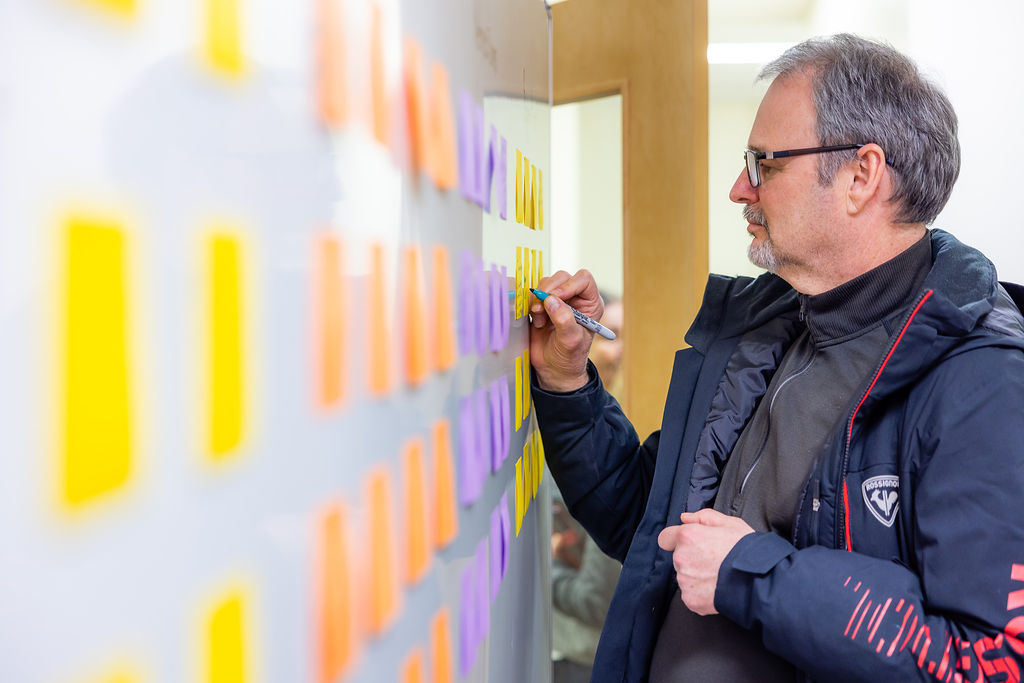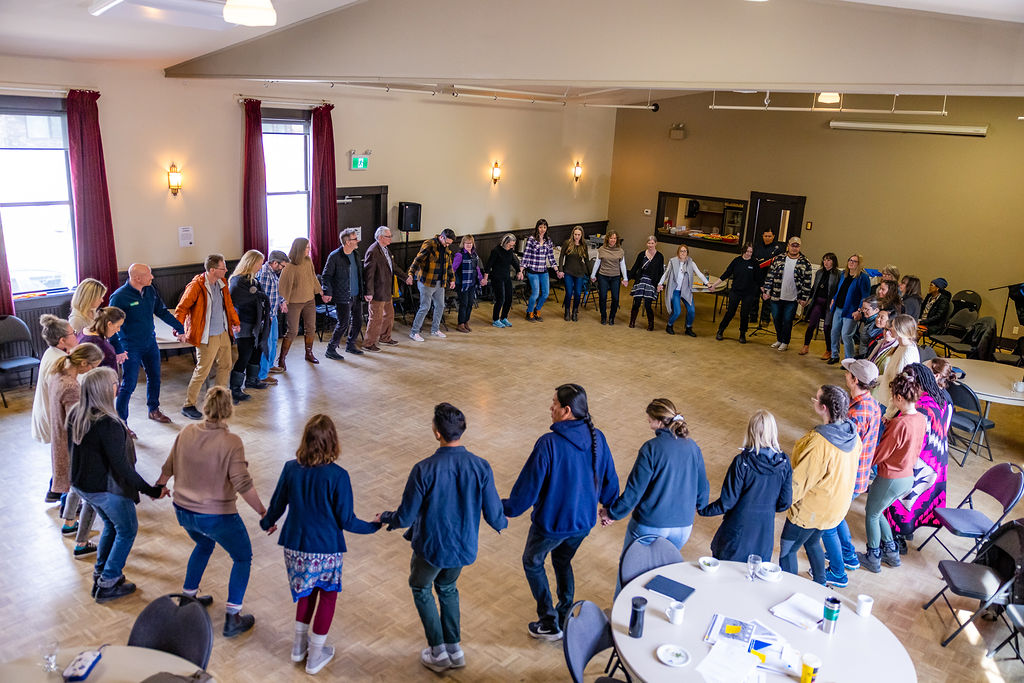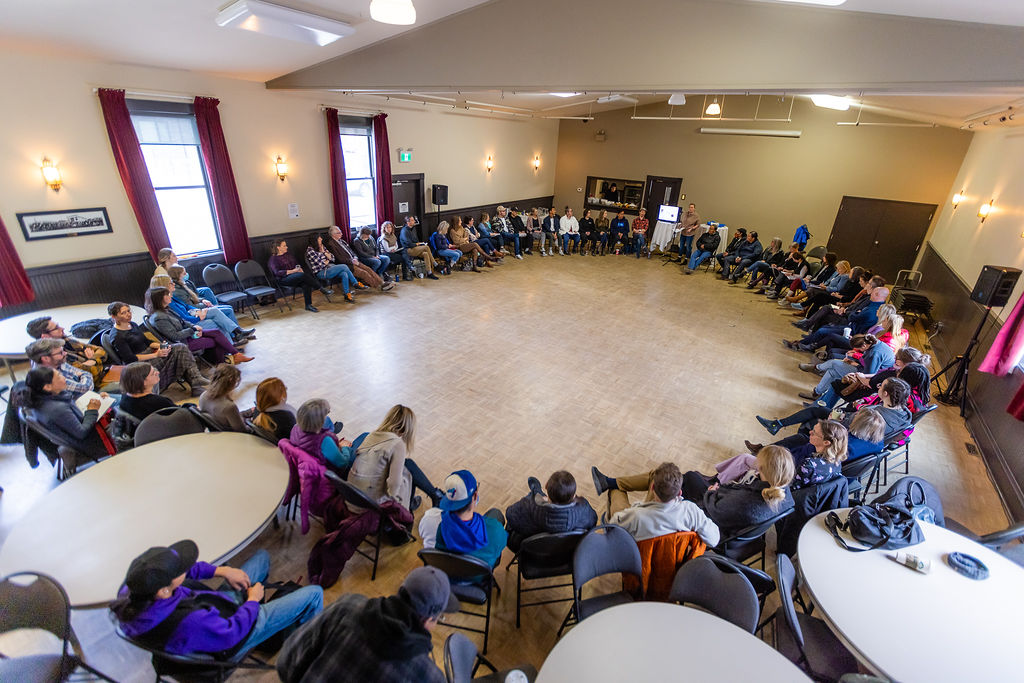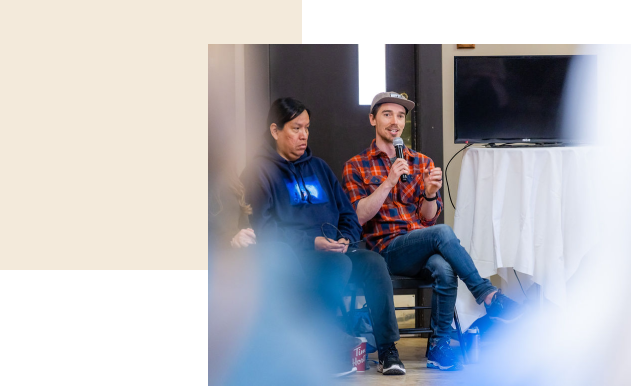
Overview
Elder Terry Rider shared with Bow Valley civil society as part of the Moving Mountains Initiative, that Stoney Nakoda people ‘are here, have always been here, and will always be here’. Stoney Nakoda people are stewards of the land in the Bow Valley and throughout Stoney territory, since time immemorial.
Stoney Nakoda people were among the Indigenous peoples who first welcomed settlers to this place – to Mînî hrpa (Stoney Nakoda word for Banff site and waterfall off Cascade Mountain) – many years ago. Knowledge shared by community included stories of the role of Stoney Nakoda peoples as the original stewards of these lands. Discussions about the pertinence, need and influence of this role ensued, including speculation about what is needed to deepen Indigenous and Non Indigenous relations today. Building trust, celebrating cultures and sharing learnings can benefit resident and visitor relationships and help bridge communities in the Bow Valley.
Indigenous Knowledge Circle
The Indigenous Knowledge Circle emerged from the Moving Mountains initiative. Originally composed as a Learn and Try group of the Moving Mountains initiative with a purpose to meaningfully address the unique issues facing Bow Valley Indigenous peoples, the group grew and evolved to create an Indigenous Knowledge circle of 20+ grassroots Indigenous artists and community leaders. The Indigenous Knowledge circle has become the central governing body of Mînî hrpa, an Indigenous cultural center in banff. The Knowledge circle provides guidance and shares appropriate knowledge with Non-Indigenous community in the Bow Valley. The Indigenous Circle’s strategy draws on building up Reconcili-ACTIon through celebrating culture, centering youth, sharing cultures and worldview, growing Indigenous economies, creating sovereign spaces and support services in safety, food, transportation, and recreation. Guiding principles include shared leadership, shifting power, new metrics, models and frameworks, interconnection and spirituality, collaborative tourism, reducing racism and discrimination, and implementing the 94 calls to action of the Truth and Reconciliation Commission.
The Indigenous Knowledge Circle was invited to reflect and consider the three community needs identified in Phases 1 and 2 of the Moving Mountains Initiative: the need for an Indigenous advisory, the need to celebrate and share Stoney culture, art and worldview, and the need for Indigenous-led spaces in Banff and Canmore, to help communities to gather, share and learn.
A collective response and opportunity space emerged – that of incubating an Indigenous Cultural Centre in Banff, AB. The Indigenous Knowledge Circle discussed an Indigenous cultural center as a way forward that could address all three needs as identified by civil society as above. With Nakoda language guidance from community leaders Travis Rider and Cory Beaver, the group named the Indigenous Cultural Centre Mînî hrpa (Stoney word for Banff site), and used Stoney Nakoda words Oyade (building of intentional relationships in this place, town) Gitchi (partner) Yabi (going, doing) and Ti (house) to describe the Indigenous Cultural Centre in Banff. Mînî hrpa centers Indigenous voice, perspective, and leadership. These things are needed to advance Truth and Reconciliation in Banff and Canmore today.
Mînî hrpa organized and shared a soft launch event at the Banff Canmore Community Foundation building in late March 2023. The Indigenous-led event featured Stoney speakers, artists, performers, drummers, ribbon dress makers, beadwork, traditional tools, regalia and other creative sharing of Stoney Nakoda culture. Read more about the soft launch event here.

Incubation of an Indigenous Cultural Centre
Mintoyadebi - All My Relations

Daryl Kootenay, dancer, community leader and co-founder of Nakoda Youth council, shared how on the path to reconciliation, there are commitments we must all make. Daryl spoke about the importance of sharing and caring for ‘mintoyadebi’ or “all my relations”, with food, shelter and medicines that naturally graze these mountains. Mintoyedabi holds a circular opportunity that begins with our beliefs about ourselves. In connection with Truth and Reconciliation, these teachings have guided many people in the Bow Valley and beyond, to develop individual commitments and shared commitments in Truth and Reconciliation. This is needed work that will help us to co-create a connected community of care and belonging with Indigenous peoples in the Bow Valley.
The need and desire for an Indigenous Gathering Place in Banff and Canmore has existed for decades. Through grass-roots initiatives of passionate like-minded peoples devoted to the cause, momentum and support has culminated to a vital stage of the process: a place to call home. In 2022, the Banff Canmore Community Foundation offered the BCCF building space at 214 Banff Avenue to the Indigenous Circle – as a space to gather, share and learn. For at least its first year, it will be based out of the BCCF building, until a permanent space is secured.
In summer 2023, Banff and Lake Louise Tourism, the Banff Canmore Community Foundation and the Indigenous circle entered an agreement to the end of 2023, to mark the continued incubation of Mînî hrpa, in partnership with the community. The incubation of the Indigenous cultural center is jointly supported and funded by Banff Lake and Louise Tourism and BCCF, and Mînî hrpa is seeking partnership from additional Bow Valley organizations, industry, funders and municipal entities. BCCF’s Truth and Reconciliation Fund also is providing a financial pathway to support the work of Mini hrpa. To learn more and to donate, visit https://www.banffcanmorecf.org/contribute/truth-and-reconciliation-fund/
For the remainder of 2023, BCCF will continue as the backbone organization of Mînî hrpa, as it self-defines and mobilizes its journey towards self sustainability.






Connecting to Purpose
Purpose
We connect newcomers, visitors and local communities in shared learning, leadership, and Reconcili-ACTION.
Vision
We live in a connected community of care and belonging in the Bow Valley and across the globe, practicing right relations with ourselves, each other, nature, and the land.


Principles
- Promoting shared leadership
- Engaging voices of people with lived experience in marginalized groups and cultures
- Reducing racism and discrimination and promoting diversity in our practices
- Establishing collaborative metrics, models and frameworks
- Mobilizing awareness and empathy of intergenerational trauma
- Employing new approaches in collaborative tourism
- Increasing multi-sectoral engagement
- Establishing shared Language and Meaning
- Employing trauma -informed approaches
- Implement 94 calls to action of the TRC
Strategic Intentions
The goals of Mînî hrpa establish a clear line of sight on how we are approaching intercultural collaboration together. Our strategy is guided by the voices of lived experience with support from the Indigenous Knowledge Circle, and invites perspectives from the Bow Valley Indigenous and Allies Group, and the collaborative participants of the Learn and Try Groups of the Moving Mountains Initiative.
1
Bow Valley residents and visitors live in a strong, supportive and inclusive community
2
All Indigenous Peoples are equal participants in Bow Valley’s future.
3
All Bow Valley residents have sufficient health, wellness, affordability and livability to grow belonging in this community
Stories of Reconcili-Action
Toolkit
The Moving Mountains Initiative partnered with Indigenous led evaluation and research consulting agency, Reciprocal consulting to help tell the story of the initiative and capture collaborative learnings.
Shared Learnings
Moving Mountains Initiative partnered with Ever So Curious to help capture collaborative case stories on what the Bow Valley can do more powerfully, and to highlight pathways forward in transforming the flow of resources in the Bow Valley.

Key Partners
In summer 2023, Banff and Lake Louise Tourism, the Banff Canmore Community Foundation and the Indigenous circle entered a agreement to the end of 2023, to mark the continued incubation of Mînî hrpa, in partnership with the community. The incubation of the Indigenous cultural center is jointly supported and funded by Banff and Lake Louise Tourism and BCCF. Mînî hrpa is seeking additional partnerships from Bow Valley organizations, industry, funders and municipal entities. BCCF’s Truth and Reconciliation Fund also is providing a financial pathway to support the work of Mînî hrpa. To learn more and to donate, visit https://www.banffcanmorecf.org/contribute/truth-and-reconciliation-fund/
Key Dates
2020
Banff Canmore Community Foundation, Town of Banff, Town of Canmore are successful recipients of an Alberta Civil Society Grant from the province. The Moving Mountains Initiative was born.
2021
In Fall 2021, Jeanie Macpherson accepts role of Lead, Moving Mountains Initiative. In late Fall 2021, the Initiative adopts a Co-Leadership model with Daryl Kootenay and Jeanie Macpherson working together as Co-Leads of the Initiative.
2022
The Indigenous Knowledge Circle emerges from the Initiative’s civil society consultation work, revealing itself as central to Indigenous knowledge exchange and sharing, and in advisory to the work of the initiative.
The Bow Valley Indigenous and Allies Working Group emerges, bringing together rightsholders and stakeholders in meaningful, regionally based dialogue.
2023
The Indigenous Knowledge Circle of the Moving Mountains Initiative becomes the governing circle of Mînî hrpa.
The first ever Indigenous Cultural Pop-up Centre is held in March 2023 in Banff National Park. The event is the soft launch of Mînî hrpa.
The soft launch of Mini Hrpa in Banff signifies the end of one chapter and the start of another in the Bow Valley… Read More


